Peggy Riley's Blog
August 20, 2025
Substacking
Do you have a Substack? Me too, though it’s taken me a while to figure out how I want to use it, when and why.
I’m changing – and so is where I want to write. This site will continue to be a container for upcoming events as well as writing I’ve done so far, while my Substack, Notes from the Blue House, will be for newer writing, all the kinds I aim to do. That’s the plan, anyway.
Substack’s a mighty ocean, and I’m a tiny fish, but my words are free and friendly. You can read the first post here: Welcome.
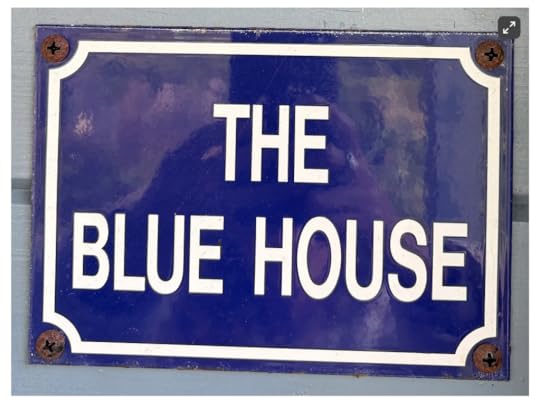
July 30, 2025
Your Words in the Wild with Bracken & Bloom
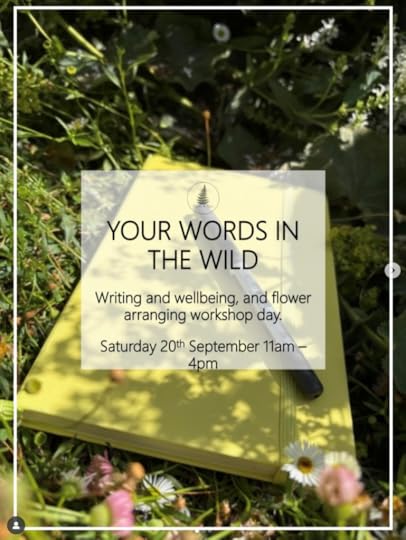
On Saturday 20 September, I am delighted to join Bracken & Bloom for a day of workshops in the heart of the Kent countryside – a gorgeous day out!
We’ll start with teas and coffees at 10:30am before a two-hour writing workshop, to celebrate and prepare for the equinox: Where do we find balance in our writing and our lives? What do we want to harvest? How can we learn to let go – like the leaves? After a delicious cheese and charcuterie lunch, wonderful Kate will lead a flower arranging workshop, using fresh, seasonal, and sustainable locally-grown flowers. At 4pm, you’ll leave with a meadow-style table centre in a cement planter – all included in the £70 ticket price.
To learn more – and to book your place – please visit Bracken & Bloom on Instagram or on Facebook. It would be a treat to see you there.
May 13, 2025
Hope & Anchor
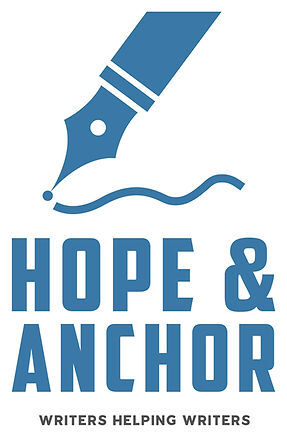
Ahoy! So delighted to announce our new venture. I am one-third of Hope & Anchor Writing:
Hope & Anchor is three writers: Peggy Riley, Sarah Leipciger and Joanna Quinn. We met on a creative writing course nearly twenty years ago. We know from experience that writing requires both encouragement (hope!) and support (an anchor!) so founded Hope & Anchor to help our fellow writers improve their skills and stay motivated.
To learn more or to book on an upcoming writing course in Bethnal Green (East London), Whitstable (East Kent), or Sherborne (Dorset), please visit our site: https://www.hopeandanchorwriting.com Or sign up to join the mailing list.
November 28, 2024
Cove Park Residency
I am back from snowy Scotland and a wonderful two-week residency at Cove Park. It is so rare to have two uninterrupted weeks to write and think and stare; I am very grateful to my university, Canterbury Christ Church, for supporting my research. In that time, I was able to finish a book proposal and submit it, add 40K to a non-fiction project and 10K to a nearly finished novel. While I was there, we moved from autumn to winter. The pond froze outside the window in my little shipping container home, and snow fell in fat and lacy flakes. I raced home, just ahead of Storm Bert via one taxi and three trains.
If you would like to go to Cove Park too, here’s a link to learn more. Cove Park. For pictures of snow and the frozen pond through my window, come find me on BlueSky: @peggyriley.bsky.social
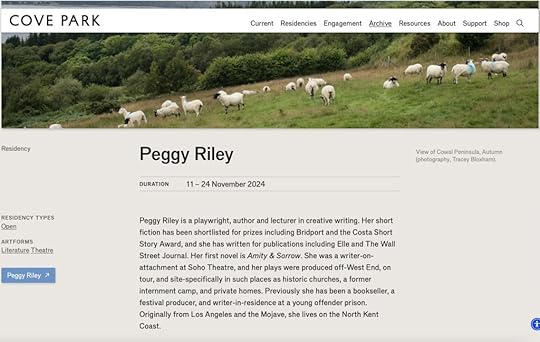
November 9, 2024
New Ways to Workshop
Here’s a screenshot of the wide variety of talks and workshops on offer today from NAWE, the National Association of Writers in Education. My talk was on New Ways to Workshop: De-stressing, Decentring, Decolonising. Now, to put my notes and slides into a coherent article!
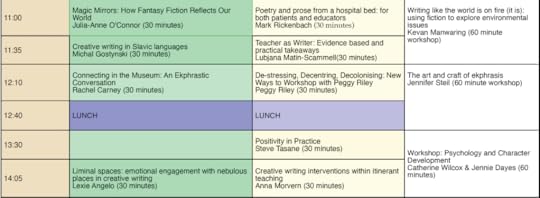
June 17, 2024
Flash Flood 2024
Very happy to be a part of this year’s National Flash Fiction Day Flash Flood. To read my flash, ‘Coyote Summer’, please click this link: Coyote Summer . Many thanks to the busy team at National Flash Fiction Day!
February 27, 2023
Faversham Literary Festival

Very happy to return to Faversham’s fabulous festival to chat with Sarah Jane Butler and celebrate her debut novel, Starling, which I also had the pleasure to read as a PDF. Congratulations, Sarah – and Faversham Lit Fest!
November 9, 2021
COP26 & The Writing Circle
Last year, my student writing group – The Writing Circle – wrote a collaborative piece about the experience of lockdown, “a year of this”. This year, we felt called to respond to COP26 and questions about climate change. How do we feel? What can we do? We work together online, writing to prompts in real time on a Padlet, a shared digital cork board. During half term, we printed the Padlet out, cut it into pieces, and pasted it together in a “real” room in the library – as well as online.
In these times of climate anxiety and powerlessness, it might feel like we can’t do much of anything to affect change. But staying engaged with our own thoughts and feelings is a start. We can refuse to be in denial about what we witness and experience. We can ask ourselves and each other difficult questions. The end result of our questions is currently installed in the COP26 Hub in the Creative Arts building at Canterbury Christ Church.
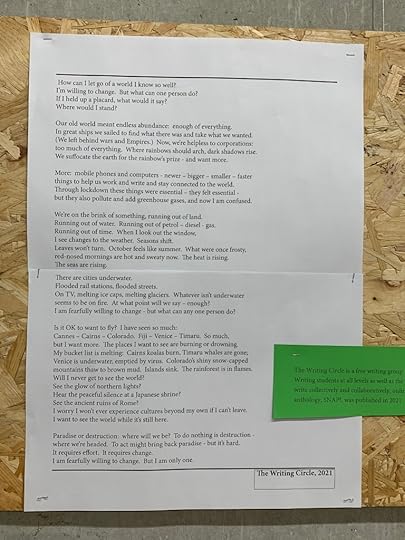
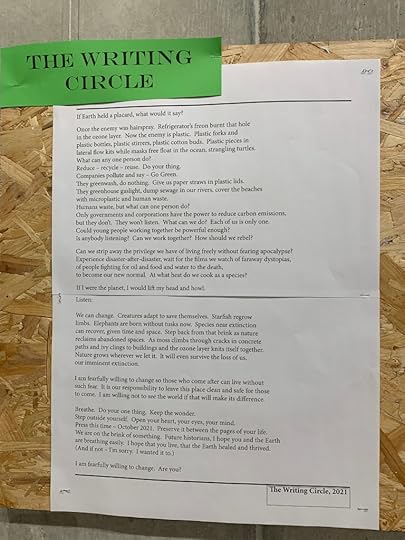
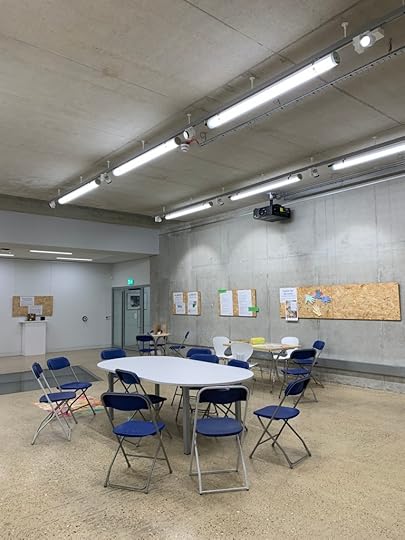
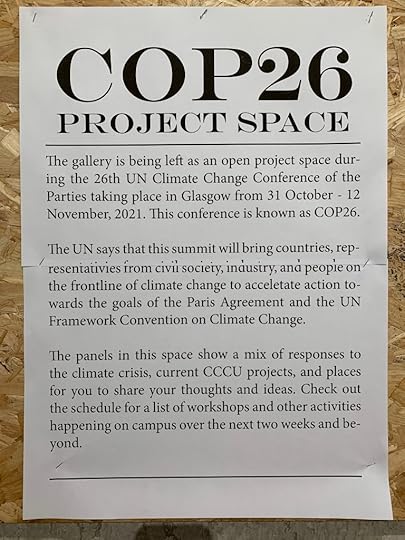
August 5, 2021
New anthology – out now in US & UK

Whoop! Today is the UK paperback release of last year’s anthology, The Best, Most Awful Job, released in the early days of the pandemic – and also the US hardback release of same. No party ‘cept for a little online cheering – but there are some cheering blurbs by other folks as well as tweets and posts on social media.
Maybe you’d like to read? You’ll find me – and a whole lot more wonderful authors writing their hearts out.
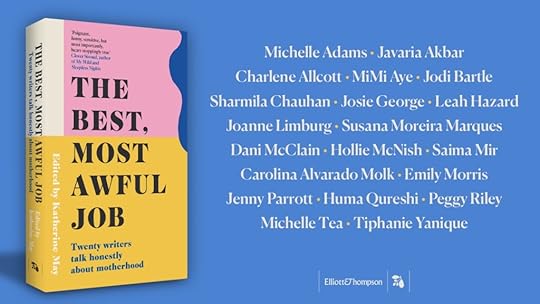
June 4, 2021
Time for morning pages!
I’ve written a lot about morning pages. I include them as a practice in the modules I teach, and I use them myself in a lot of different ways. But – what are they? And how do they work?
At the most basic level, morning pages are three pages of longhand – or 750 words on a laptop – free writing. They are not high art. They are not even ‘writing’. They are containers for anything and everything that crosses your mind. There is no wrong way to do them – and they are for your eyes only.
Morning pages are a system started by Dorothea Brande in her 1934 bestseller, Becoming a Writer, later revived by Julia Cameron in The Artist’s Way. Both Brande and Cameron have strong ideas about what they should and should not be. Both advocate doing morning pages as early as you can manage them: Cameron insists that they be done by hand, while Brande is happy for them to be done by typewriter to help a writer build up stamina and increase output. I do them online at 750words.com – and have been doing so for more than 10 years now. The only real “rule” is to keep your hand moving. Try not to stop. Don’t think too hard about what you’re writing – you’re trying to access different ways of thinking – and definitely don’t stop to edit or rewrite. Morning pages are about generating new material – it can be polished later, if you like.
The best way to learn what they are – and what they can be for you – is to do them. After all, they are a practice, not a theory. They are done in the doing, not the planning. During the pandemic, I ran some creative workouts on social media, hoping to encourage people to experiment with writing in new ways. One such way was to consider how morning pages might benefit a writing practice as well as wellbeing. Here are some of the ways that I use morning pages. Maybe they can work for you?
FREE WRITE: Open a journal and a document and just write down whatever comes to mind. Don’t stop to think or censor. Sometimes we don’t know what we think until we can see what we say.
I AM: Sometimes prompts can get this writing going. They can be as simple as these: I am… I’m not… I want… I don’t want… I know… I don’t know… I feel… I don’t feel…
They can be time specific: Today I… Yesterday I… Tomorrow I…
All you need to add are simple nouns and verbs. Today I am… Yesterday I felt… Tomorrow I want…
From there, you can go anywhere – but if you ever feel stuck or run out of steam, you just circle back to the same prompt and begin again. What else is there to say? What else are you?
BRAIN DUMP: Is your brain full? Yeah, me too – sometimes. We all get busy heads – and living through a pandemic hasn’t helped. Morning pages are a great place to set down burdens. They are a container big enough and flexible enough to hold all our thoughts and feelings. Sometimes if we write things down, we can convince our brains that we are listening to them and taking their concerns seriously. After all, their job is to protect us. It isn’t their fault if they’re hyper-vigilant, scanning the world for danger. It isn’t our fault either. If your brain is full of chatter, see if you can empty it into morning pages.
ROOTING: Sometimes our heads are so full, they’re in a spin. We don’t know if we’re coming or going, whether we’re projecting forward in worrying or backward in regret. Morning pages can root us in the now. Centre yourselves in time and space, wherever you are. Write yourself into place, using all your senses.
What can you see? Describe it: colour, texture, shape and size. Lift your head – what else can you see?
What can you hear, beyond the sound of your own hand on the page or the keys? What small sounds are near you that you’ve stopped hearing? What can you hear far away? How far? What can’t you hear?
What can you smell? Does anything have a smell around you? Can you smell yourself – or does everything still smell of sanitiser? Maybe find something that can smell, so you have something to describe.
What can you taste? (Morning pages require big cups of tea, in my opinion!).
Lastly, what can you touch? Focus on the pressure between your hands and your words, the contact of your body with your writing: pen or keyboard. Plant your feet and feel how the ground supports you, holds you up. Sit back, aware of the contact between your body and the chair and floor. Feel how supported you are.
Touch also relates to what touches us. How do we feel in our clothing? How do we feel in our skin? Is there tightness or looseness? Where are the places we are feeling? Touch also refers to pressure, temperature, and sensations. How are you feeling? No, really. How are you really feeling?
LISTING: Who doesn’t love a list? Sometimes my morning pages are to-do lists. Often, they start out that way, so that I can clear my head of whatever it is I’m worrying about or afraid that I’ll forget. From there, I might examine the list to break it down into smaller steps or maybe to write about my priorities, what feels in balance and what does not. Sometimes I make larger, more intentional lists that might form long-term plans. What do I want to achieve this week or month or season? How do I want to feel? What am I not doing enough of? What would I really like to do? See if you can list 10 things – and then another 10.
PLANNING: When I’m low on time, I use morning pages as a planner, to lay out longer projects or to sketch out scenes. It means that, when you do have time to write, you’ll find you’ve already laid the groundwork out to get you started. No more blank page! You can read more about this process here:
CREATIVE PROMPTS: Where do ideas come from? Here is where morning pages get fun. After all, maybe you don’t want to start your mornings going over old ground or making laundry lists. Morning pages can be a creative space to start new pieces or projects through simple, one line fire-starters that can spark ideas.
Remember that you can always change tense and POV. If you always write in first person (I), work with second (you) or collective third (they). Here are some quick lines to get you going:
It was in the corner.
She wasn’t expecting that.
We could see it from here.
You hold it in your hand.
It had never been so cold.
Look out!
You can keep a jar of words or prompts that you find useful. Try first lines or last lines of novels or stories. The first whole sentence on page 100 of a novel is also usually pretty good. You can also find one through bibliomancy: open a book at random and find a sentence to use. Prefer a visual prompt? I have a Pinterest board for that: You can always Google “writing prompts” to find a million more – or visit storyaday.org.
I’ll be running a morning pages workout later in the summer. If you want to join in, sign up to the blog here or follow me on Twitter: @Peggy_Riley – Until then, whatever gets you writing – keep writing!



